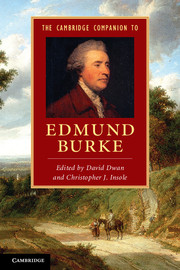Book contents
- Frontmatter
- Contents
- Contributors
- Acknowledgements
- Method of Citation
- Chronology
- Introduction Philosophy in Action
- 1 Burke’s Life
- 2 Burke, Enlightenment and Romanticism
- 3 Burke as Rhetorician and Orator
- 4 Burke’s Aesthetic Psychology
- 5 Burke on Law and Legal Theory
- 6 Burke on Political Economy
- 7 Burke and Religion
- 8 Burke and the Constitution
- 9 Burke and the Natural Law
- 10 Burke and Utility
- 11 Burke and the Ends of Empire
- 12 Burke and the American Crisis
- 13 Burke on India
- 14 Burke and Ireland
- 15 Reflections on the Revolution in France
- 16 Burke’s Counter-Revolutionary Writings
- 17 Burke in the United States
- Further Reading
- Index
13 - Burke on India
Published online by Cambridge University Press: 05 December 2012
- Frontmatter
- Contents
- Contributors
- Acknowledgements
- Method of Citation
- Chronology
- Introduction Philosophy in Action
- 1 Burke’s Life
- 2 Burke, Enlightenment and Romanticism
- 3 Burke as Rhetorician and Orator
- 4 Burke’s Aesthetic Psychology
- 5 Burke on Law and Legal Theory
- 6 Burke on Political Economy
- 7 Burke and Religion
- 8 Burke and the Constitution
- 9 Burke and the Natural Law
- 10 Burke and Utility
- 11 Burke and the Ends of Empire
- 12 Burke and the American Crisis
- 13 Burke on India
- 14 Burke and Ireland
- 15 Reflections on the Revolution in France
- 16 Burke’s Counter-Revolutionary Writings
- 17 Burke in the United States
- Further Reading
- Index
Summary
India was one of the great causes of Burke’s political career, one that he pursued from around 1780 until his retirement from parliament. Indeed, in his own retrospective judgement, it was the cause ‘on which I value myself the most’ (WS, IX: 159). By ‘India’ here is meant the incipient British empire in India or, more precisely, the regime of the English East India Company, to which parliament had ceded not only a commercial monopoly, but also authority over those parts of India that came under British control. ‘India’ also denotes the distant country and people as Burke tried to imagine them, and for whom he became a passionate advocate.
Burke became convinced that the East India Company (and by extension parliament) was abusing its trust by perpetrating (or permitting) severe forms of oppression and plunder of India and, more ominously, destroying the social foundations of a great, though alien, civilisation. Analysing and exposing the various abuses of imperial rule, Burke (together with his fellow Whigs under Fox) called for reforms. More dramatically, as a way of raising both parliamentary and public consciousness about the affairs of India, Burke pursued the prosecution and impeachment of Warren Hastings, the former governor-general of Bengal, whom Burke believed had directed and personified many of the abusive practices.
- Type
- Chapter
- Information
- The Cambridge Companion to Edmund Burke , pp. 168 - 180Publisher: Cambridge University PressPrint publication year: 2012

